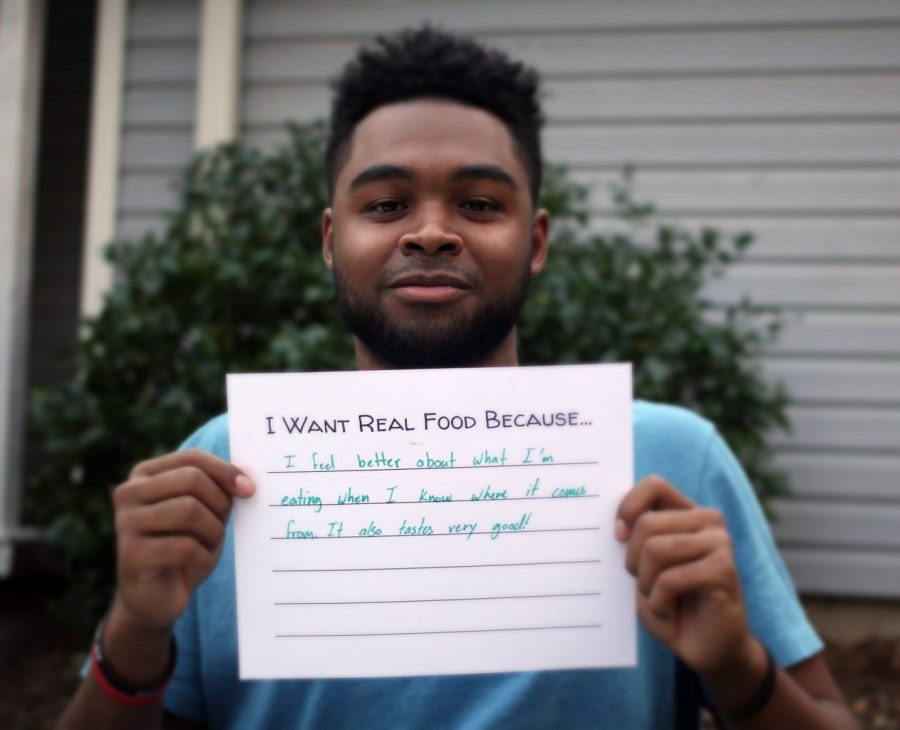Nick Baynard
A&F Staff Writer
[email protected]
Music blasts from the porch of the Campus Ministry House on a sunny Monday afternoon, as students at the Real Food Revolution Dinner come up to the buffet table to fill their plates with food they do not have to feel guilty about eating.
The dinner serves to raise awareness about a movement among college campuses to provide higher quality food in their dining halls and at their events, said freshman student Jenna Ventrella, who organized the event for Active Students for a Healthy Environment and the Student Environmental Center.

“This event is to promote the Real Food Challenge, and the goal of the Real Food Challenge is to get Brown Hall to serve 20 percent real food by year 2020,” Ventrella said. “Real food is food that is local, organic, humane or fair trade.”
To be considered real food, the food must meet one or more of the above criteria.
Most of the food on UNC Asheville’s campus is supplied by Chartwells, a subsidiary of multinational foodservice company Compass Group.
“As of right now, Chartwells is serving less than 5 percent real food in the dining hall and in Highsmith,” Ventrella said. “We’d like to keep our campus sustainable because that’s what we’re all about and it just makes sense for us to pass the Real Food Challenge.”
Participants attending the Real Food Revolution Dinner were given the opportunity to sample a variety of foods from local restaurants and cafés.
“All of the food that we have set up here is real food,” Ventrella said. “Most of it was donated from local businesses such as Green Sage, Homegrown, Vortex Doughnuts, Neo Burrito and so on.”
Ventrella works for the SEC as an eco-representative and organized the event as part of her duties to the organization.
According to 20-year-old Andrea Genna, who works for the SEC and manages the eco-reps, the event was a success.
“This is the biggest event that an eco-rep has ever planned,” Genna said. “I am very impressed with Jenna because, usually, eco-reps aren’t this enthusiastic.”
Emma Hutchens, a 26-year-old alumna of UNCA and the North Carolina coordinator for the Real Food Challenge, gave a brief presentation about the history of the movement at the event.
“Living in a place like Asheville, where we’re surrounded on all sides by farms and you could throw a rock and hit four grocery stores, it’s easy to feel that the food here at UNCA, a tiny liberal arts school is probably pretty good, but it’s not,” Hutchens said. “There’s a research project that’s been happening at UNCA that is going through all of the purchasing receipts for dining… probably less than five percent of the food purchased by UNCA falls under any of the real food categories.”
While Hutchens was a student at UNCA, she was working toward the same goal ASHE and the SEC are pursuing with this event, but unfortunate circumstances halted her progress.
“I’m really excited to see this going on here,” Hutchens said. “I was working on the same initiative, but Chancellor Anne Ponder retired so there wasn’t a signatory for us to go to.”
The diners attending the event were urged by Ventrella to fill out a short form about why they want real food served here on campus so they can be assembled into a presentation for campus administrators.
“We want people to write on the sheets saying, ‘I want real food because…,’ so that we can take pictures of people holding them up,” Ventrella said. “We’re going to present the pictures to the chancellor with our petition about the Real Food Challenge.”
According to Hutchens, this movement is similar to the divestment movement on campus.
“The way that our current food system works is that we, as people who buy food, and institutions that buy a lot of food and spend a lot of money are mostly buying industrial food,” Hutchens said. “That means that we’re voting with our dollar and that we’re saying, ‘This is the food system that we support with our money.’”
During the dinner, students were presented with a chance to describe why they support “real food” on campus:


















